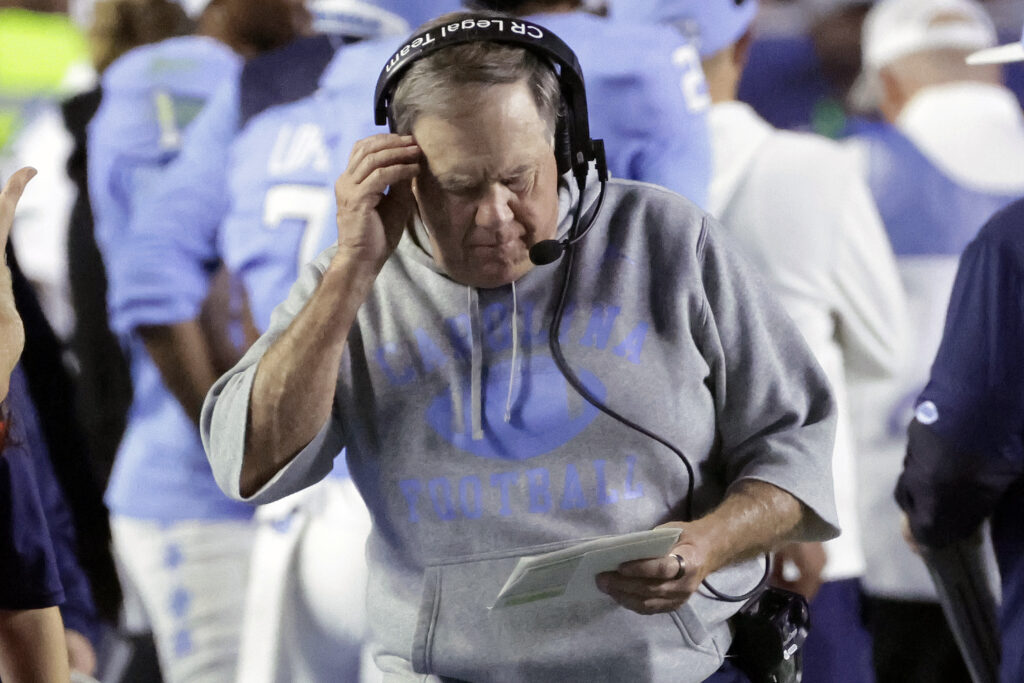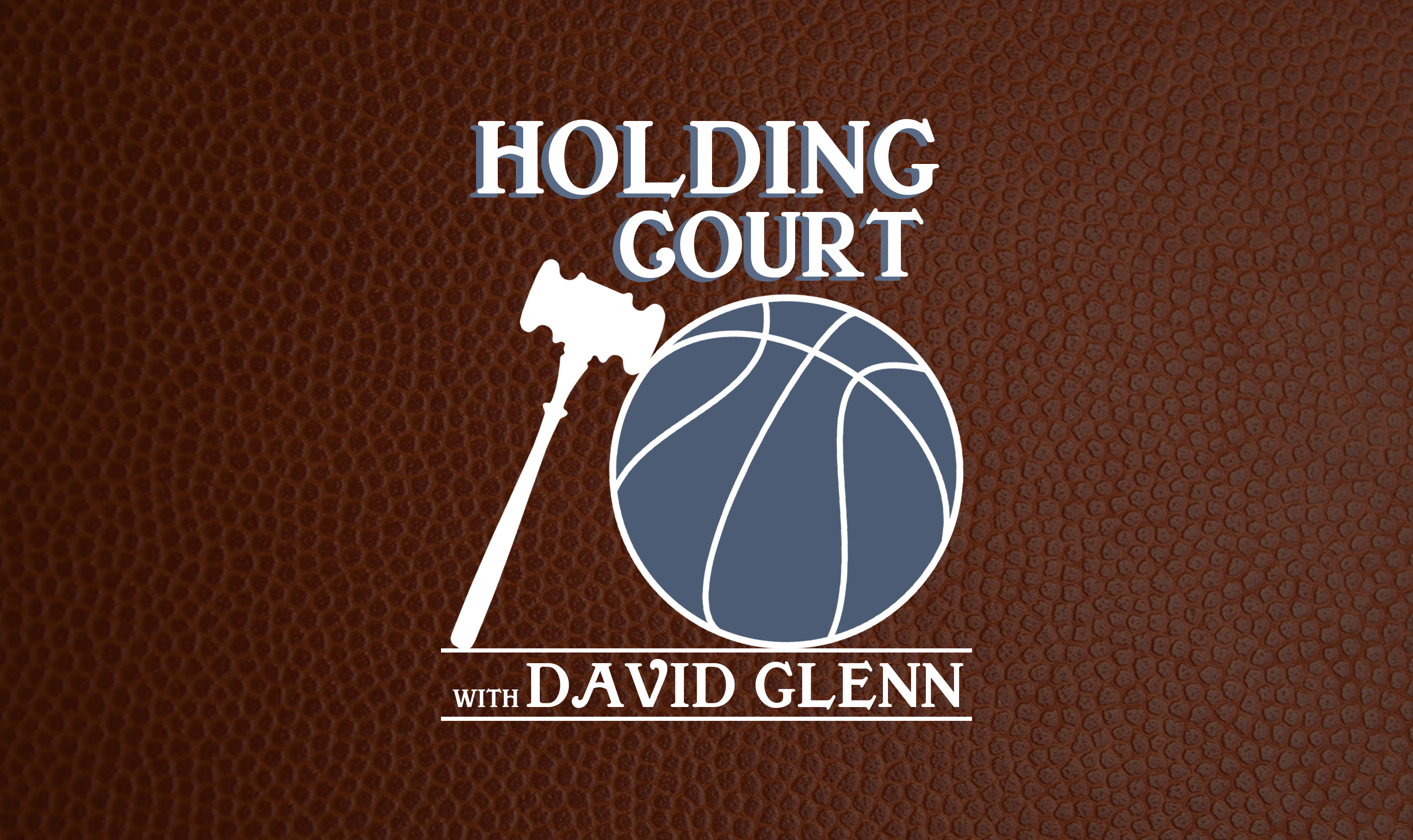Raw Numbers Show Belichick Debut Approaching Historically Bad Turf
By David Glenn
There’s plenty of room for intelligent debate regarding many aspects of legendary National Football League coach Bill Belichick’s ongoing attempt to succeed at the college level, but it’s not too soon to draw at least one conclusion.
His first UNC team has been bad.
Really, really bad. Horrifically bad. Historically bad.
Indeed, from a purely objective, statistical standpoint, the 2025 Tar Heels have been one of the worst power conference teams of the last decade-plus.

(AP Photo/Chris Seward)
Among the 700-plus individual teams that have competed in a Power Five (now Power Four) conference over the past 11 seasons, only the 11 squads listed below finished their seasons with rare, negative thresholds (-30 or worse) for both offensive efficiency and defensive efficiency.
(The categories are known as Adjusted Offensive Expected Points Added and Adjusted Defensive Expected Points Added. Expected Points is a metric that assigns a point value to every play based on down, distance and field position. Adjustments then are made to the raw data based on quality of opponent, home-field advantage and whether the game is still in a competitive stage, i.e., “garbage time” results matter much, much less.)
In its three games against Power Four opponents, Carolina lost 48-14 to TCU, 34-9 at UCF and most recently 38-10 to Clemson. In all three cases, those who watched the second half of those games easily understood that if head coaches Sonny Dykes, Scott Frost and/or Dabo Swinney had wanted to make the final margin even uglier, they almost certainly could have done so.
Here in mid-October, as the Tar Heels tackle their second (and final) open week of the season, only two of the 68 Power Four teams competing during this 2025 campaign are in jeopardy of joining this list of the worst teams in recent college football history: UNC and Oklahoma State.
The same two schools also are recognized as the worst in the Power Four this season by several other widely used performance metrics, including ESPN’s Football Power Index and SP+, an advanced analytics tool created by the Football Outsiders website in 2008.
The Cowboys fired their long-time head coach, Mike Gundy, on Sept. 23, in the aftermath of the team’s 69-3 loss at #6 Oregon and its 19-12 home defeat against Tulsa, a bottom-tier squad from the American Conference.
Gundy was in his 21st season leading the Oklahoma State program, the second-longest-tenured head coach among the 136 at the Football Bowl Subdivision level. The Cowboys opted to pay a reported $15 million buyout, under the contractual terms of Gundy’s dismissal.
Belichick, of course, is only in his first season with the Tar Heels. He is making $10 million per year, and the first three years of his five-year UNC contract are fully guaranteed.
The list below includes four other first-year head coaches. Among the entire group, only Vanderbilt’s Clark Lea and Kansas’ Lance Leipold survived their anemic debuts and built at least some winning teams in the aftermath. The others never really got their programs out of the gridiron gutter and ultimately were fired or resigned within a few years, if not immediately.
Year Team (Record), Head Coach
2025 North Carolina* (2-3 so far), Bill Belichick^
2025 Oklahoma State* (1-4 so far), Mike Gundy (fired during 2025 season)
2022 Colorado (1-11), Karl Dorrell (fired during 2022 season)
2021 Colorado (4-8), Karl Dorrell (fired during 2022 season)
2021 Kansas (2-10), Lance Leipold^ (still with Jayhawks)
2021 Vanderbilt (2-10), Clark Lea^ (still with Commodores)
2020 Kansas (0-9), Les Miles (fired after 2020 season)
2019 Georgia Tech (3-9), Geoff Collins^ (fired during 2022 season)
2019 Rutgers (2-10), Chris Ash (fired during 2019 season)
2018 Rutgers (1-11), Chris Ash (fired during 2019 season)
2017 Illinois (2-10), Lovie Smith (fired during 2020 season)
2017 Oregon State (1-11), Gary Andersen (resigned during 2017 season)
2015 Kansas (0-12), David Beaty^ (fired after 2018 season)
^—first year of tenure
*—season ongoing
In theory, another full week of practice (without a game) could enable the 2-3 Tar Heels to improve enough to perhaps have a chance against the latter portion of their fairly manageable schedule: at Cal, Virginia, at Syracuse, Stanford, at Wake Forest, Duke, at NC State.
However, their below-average talent base and their inept and seemingly directionless passing game may be obstacles they simply can’t overcome, at least this season.
While it’s fair to point out — in Belichick’s defense — that he wasn’t hired at UNC until Dec. 11, leaving very little time to prepare for last year’s transfer portal and even recruiting more generally, meaning the combination of transfers, high school prospects and even those Mack Brown players who had remaining eligibility if they wanted to stay in Chapel Hill.
All of that is true.
But it’s also fair to point out that first-year Wake Forest coach Jake Dickert, who was hired one week after Belichick was hired at UNC last December, somehow has the Demon Deacons — who also lack much high-end talent this season, who also lack an above-average quarterback — off to a 3-2 record, while also scaring the dickens out of undefeated and nationally ranked Georgia Tech before ultimately losing 30-29 in overtime.
Clearly, it’s possible to at least be competitive in the ACC, even when you got a late start on recruiting, even when you lack above-average talent.
That’s simply not happening at UNC right now, and it’s primarily up to Belichick to change that.
Otherwise, Belichick’s 2025 Tar Heels will join Mack Brown’s worst teams (1-10 in 1988 and 1989), John Bunting’s worst team (2-10 in 2003) and Larry Fedora’s worst team (2-9 in 2018) as the most pathetic in modern UNC football history … and perhaps even those other squads listed above, the worst Power Four teams in recent college football history.
 David Glenn (DavidGlennShow.com, @DavidGlennShow) is an award-winning author, broadcaster, editor, entrepreneur, publisher, speaker, writer and university lecturer (now at UNC Wilmington) who has covered sports in North Carolina since 1987.
David Glenn (DavidGlennShow.com, @DavidGlennShow) is an award-winning author, broadcaster, editor, entrepreneur, publisher, speaker, writer and university lecturer (now at UNC Wilmington) who has covered sports in North Carolina since 1987.
Chapelboro.com does not charge subscription fees, and you can directly support our efforts in local journalism here. Want more of what you see on Chapelboro? Let us bring free local news and community information to you by signing up for our newsletter.


